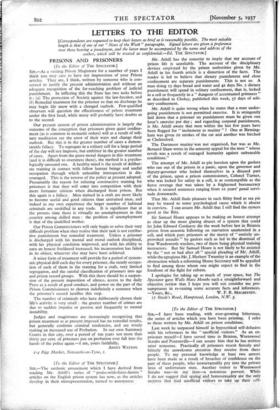LETTERS TO THE EDITOR [Correspondents are requested to keep their
letters as brief as is reasonably possible.. The most suitable length is that of one of our " News of the Week " paragraphs. Signed letters are given a preference over those bearing a pseudonym, and the latter must be accompanied by the name and address of the author, which will be treated as confidential.—Ed. Trii SPECTATOR.] PRISONS AND PRISONERS [To the Editor of THE SPECTATOR.] SIR,—AS a visiting Prison Magistrate for a number of years I think you may care to have my impressions of your Prison articles. They are, I think, written by someone who is con- cerned to justify the present administration and without an adequate recognition of the far-reaching problem of judicial punishment. In inflicting this the State has two tasks before it : (a) The protection of Society against the law-breaker, and (b) Remedial treatment for the prisoner so that on discharge he may begin life anew with a changed outlook. Few qualified observers will question the effectiveness of prison treatment under the first head, while many will probably have doubts as to the second.
Our present system of prison administration is largely the outcome of the conception that prisoners given quiet confine- ment (as is common in monastic orders) will as a result of soli- tary meditation see the error of their ways and change their outlook. But this is in the greater number of cases a demon- strable fallacy. To segregate in a solitary cell for a large period of the day will not improve, but embitter in the greater number of cases. Apart from the grave moral dangers in this treatment (and it is difficult to overstress these), the method is a psycho- logically unsound one. A healthy mind is the result of deliber- ate training in contact with fellow human beings and useful occupation through which unhealthy introspection is dis- couraged. This is the reverse of the policy at present adopted. Presumably the reason for refusing constructive training for prisoners is that they will enter into competition with their more fortunate citizens when discharged from prison. But this again is a fallacy. Men trained in a craft are more likely to become useful and good citizens than untrained men, and indeed in my own experience the larger number of habitual criminals are unskilled in any trade. It is significant that at the present time there is virtually no unemployment in this ;country among skilled men : the problem of unemployment is that of the unskilled worker.
Our Prison. Commissioners will only begin to solve their very difficult problem when they realise that their task is not retribu- tive punishment but remedial treatment. Unless a prisoner is discharged with his mental and moral outlook disciplined, with his physical condition improved, and with his ability to earn an honest livelihood increased, his incarceration has failed in its object, whatever else may have been achieved.
A wiser form of treatment will provide for a period of system- atic physical drill each day for every prisoner, the steady occupa- tion of each of them in the training for a craft, very limited segregation, and the careful classification of prisoners into age and prison record groups. With this there should be a suspen- sion of the present imposition of silence, access to the daily Press as a result of good conduct, and power on the part of the Prison Commissioners to shorten indefinitely a sentence when the prisoner's record justifies this step.
The number of criminals who have deliberately chosen their life's activity is very small : the greater number of crimes are due to sudden impulse or passion and frequently to mental instability.
Judges and magistrates are increasingly recognising that prison treatment as at present imposed has no remedial results, but generally confirms criminal tendencies, and are wisely making an increased use of Probation. In our own Summary Courts in this city, over a period of ten years not more than thirty per cent. of prisoners put on probation ever fall into the hands of the police again.—I am, yours faithfully,














































 Previous page
Previous page